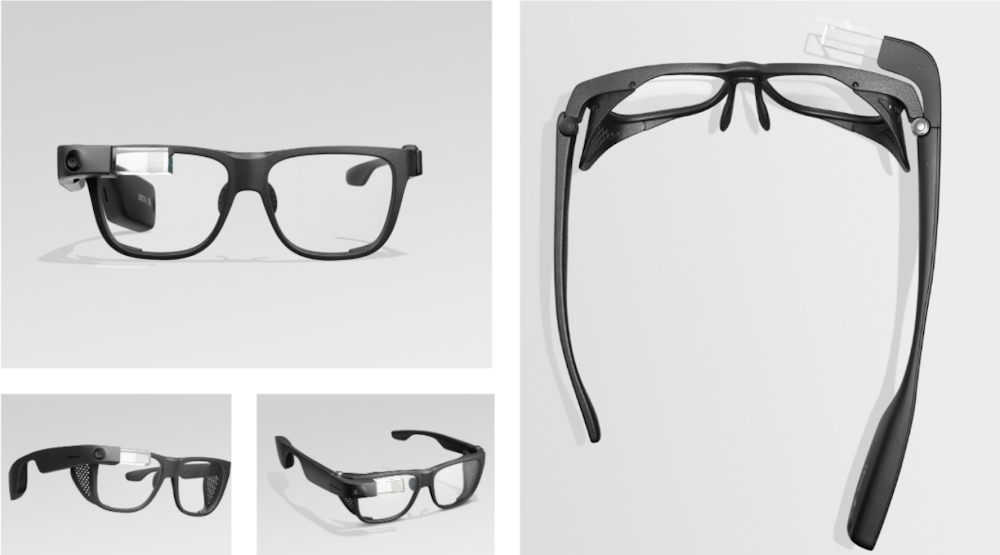Google Glass reborn with its second enterprise-ready model
The latest in the line of AR headsets gets some significant spec upgrades but retains its original design


Google has officially announced Google Glass 2 Enterprise Edition, the second iteration of its augmented reality (AR) wearable designed to boost productivity and efficiency in certain industries by providing workers with hands-free access to key information.
It looks much like the original that was launched six years ago with the same basic frame with a curling camera wrapped around the right eyepiece. It also features upgraded specs, which has been somewhat of an open secret for some time, and it also comes with a $999 price tag.
Potential functions of the device include accessing checklists via a heads-up display (HUD), viewing instructions sent by a remote assistant or send inspection photos or videos - all of which supposedly yields faster production times and reduced costs, according to Google.
While the successor to the original model has been less of a secret than Google might have liked, the specs previously touted for the new model have been outdone with the official announcement.
Google Glass review: Hands-on Google Glass banned from UK cinemas Google Glass "distracting and dangerous"
The Google Glass 2 Enterprise Edition was originally thought to come bundled with a Qualcomm Snapdragon 710 CPU. Instead, it gets the Snapdragon XR1 treatment, a noticeable upgrade supposedly capable of greater processing power, efficiency and support for AI and computer vision.
The camera also gets an upgrade from 5MP to 8MP with 720p video support, the expected battery life rises to eight hours and it will probably charge quickly with its USB-C port.
Google singles-out the manufacturing, logistics and healthcare industries in particular as the specified targets for the new headset with the likes of DHL, Samsung, Volkswagen and Opel all signing up to use the headsets with their employees.
Get the ITPro daily newsletter
Sign up today and you will receive a free copy of our Future Focus 2025 report - the leading guidance on AI, cybersecurity and other IT challenges as per 700+ senior executives
"Glass Enterprise Edition 2 helps businesses further improve the efficiency of their employees. As our customers have adopted Glass, we've received valuable feedback that directly informed the improvements in Glass Enterprise Edition 2," Google said in a blog post.
"...We're committed to providing enterprises with the helpful tools they need to work better, smarter and faster."
DHL reported a 15% jump in operational efficiency with its item picking employees which now receive real-time item picking instructions while on the warehouse floor. Employees no longer have to rely on lists and cross reference the scribbled item code with the one on the rack.
"Glass allows us to pick faster than normal and reduces the amount of errors that can happen," said a DHL associate. "It's quite easy to learn to use. Every piece of information you need is available on one screen."
Doctors are also making use of the AR technology when documenting patient records during and after a visit. "Almost a third of my day was spent with my computer; now I spend maybe just two or three minutes per patient using it," said Dr Teresa Nauenberg of Sutter Health, based on the experience of using a purpose-built app from Augmedix. The technology reportedly saves, on average, two hours of doctors' time per day.
Google originally released Glass as a consumer device years ago but it's lack of useful capabilities resulted in a low rate of adoption. In 2017 it was re-released as an enterprise headset where it saw a little more success.
Criticism related to privacy and functionality surrounded the headset before the rebrand and there was also concern about the viability of it as an everyday device. For example, the University of California researchers warned that the headset significantly reduced a person's peripheral vision while driving.

Connor Jones has been at the forefront of global cyber security news coverage for the past few years, breaking developments on major stories such as LockBit’s ransomware attack on Royal Mail International, and many others. He has also made sporadic appearances on the ITPro Podcast discussing topics from home desk setups all the way to hacking systems using prosthetic limbs. He has a master’s degree in Magazine Journalism from the University of Sheffield, and has previously written for the likes of Red Bull Esports and UNILAD tech during his career that started in 2015.
-
 Should AI PCs be part of your next hardware refresh?
Should AI PCs be part of your next hardware refresh?AI PCs are fast becoming a business staple and a surefire way to future-proof your business
By Bobby Hellard
-
 Westcon-Comstor and Vectra AI launch brace of new channel initiatives
Westcon-Comstor and Vectra AI launch brace of new channel initiativesNews Westcon-Comstor and Vectra AI have announced the launch of two new channel growth initiatives focused on the managed security service provider (MSSP) space and AWS Marketplace.
By Daniel Todd